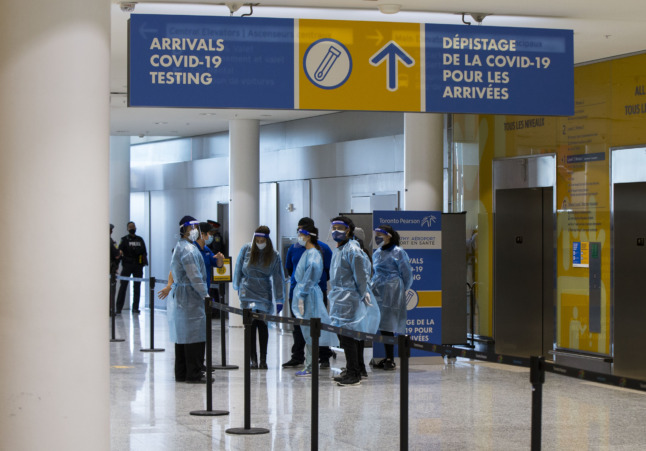I’d like to visit Canada – can I go?
Not at the moment, but you may be able to soon. Currently, Canada has a ban on all non-essential travel from European Union countries, meaning you can only enter the country if you have a valid reason, such as for work, study or reuniting with family.
From September 7th, however, the ban will be lifted for all vaccinated travellers, meaning tourists who’ve had their full set of jabs will once again be able to book a holiday.
If you happen to be an American passport-holder, your Canadian jaunt could come even sooner. From August 9th, citizens of the United State will be free to re-enter Canada – provided they’re fully vaccinated.
READ ALSO: Is the United States finally set to open up to travellers from Germany?
How do I know if I qualify as ‘fully vaccinated’?
Much like in the EU, being fully vaccinated in Canada means having had your last dose of an approved vaccine at least 14 days before your trip. So, if you’re travelling on September 15th, you’ll need to have had your final shot on September 1st – or anytime before that.
The list of approved vaccines will also sound familiar: Pfizer/BioNTech, Moderna, AstraZeneca/COVISHIELD and Johnson & Johnson are the only four currently permitted, though the government says on its website that this list “may expand in the future”.
The chart below by Our World in Data gives an idea of recent Covid trends in Germany, Canada and the US.
What counts as proof of vaccination?
If you’ve been vaccinated here in Germany – or in another foreign country – your regular proof of vaccination should be fine, but be aware that the certificate should be in one of Canada’s two national languages: English and French.
If it’s in another language, you’ll need to pay for a certified translation into either French or English in order for the certificate to be accepted.
READ ALSO:
- EXPLAINED: How to get your digital Covid vaccine pass in Germany for EU travel
- How is Germany using Covid health passes compared to other European countries?
The proof of vaccination will also have to be submitted electronically through Canada’s ArriveCAN app or web portal. At present, it sounds like a scan of the relevant page of your yellow vaccine booklet would suffice. You may also be able to take a screen grab of your digital EU vaccination certificate with the QR code for uploading.
Do I need to a take a test, even if I’m vaccinated?
Yes. All travellers over the age of five – regardless of whether they’ve had their Covid shots or not – will have to provide a negative Covid test result before entering the country. Antigen tests aren’t excepted, so this will mean shelling out for a PCR test in Germany. The test should be no more than 72 hours old.
If you’ve recently had Covid, you have the option to provide a positive PCR test taken between 14 and 90 days before travelling, instead of a negative one. This is because PCR tests can sometimes continue to show positive after a recent Covid infection.

Toronto Pearson is one of the major airports where you can book an arrival test – though from August 9th, this will no longer be necessary for vaccinated travellers. Photo: picture alliance/dpa/XinHua | Zou Zheng
As well as the test before entry, everyone entering Canada by plane currently has to take an ‘arrival test’ at the airport, which is free of charge and can be booked in advance at any of Canada’s four major airports.
In addition, unvaccinated travellers will have to take another test on the eighth day of their visit.
However, the Canadian government says it is “adjusting its post-arrival testing strategy for fully vaccinated travellers” on August 9th. From that date onwards, fully inoculated travellers won’t need to take any tests after they arrive, unless they have been randomly selected to complete one on their first day of arrival.
What else do I need to do before travelling?
Download the ArriveCAN app on your phone – or use the web portal – to register your trip, and make sure you upload your test result and proof of vaccination on there.
You’ll also have to submit details of 14-day quarantine plans in case your application for the ‘vaccination exemption’ is rejected at the border for any reason. This would include having plans for a place to stay the entire time, confirming whether you’ll be able to get basic necessities like food and water there, and giving details of the people you’ll be staying with.
READ ALSO: UK to allow fully vaccinated travellers from Europe to skip quarantine (but not tests)
If you’re unsure whether your plans would be accepted, you can hop on the Canadian government website to assess them beforehand.

Travellers to Canada will need to have a plan in place for quarantine in case their application for the so-called ‘vaccination exemption’ is denied at the last minute. Photo: picture alliance/dpa/The Canadian Press via ZUMA | Graham Hughes
After submitting all your details in the ArriveCAN portal, you’ll get a digital receipt, which you should show at the border along with a paper or digital copy of your vaccine certificate.
Travelling from Canada to Germany
On July 4th, 2021, Germany lifted all restrictions for Canadian travellers, meaning people can re-enter the country from Canada without having to register or quarantine.
However, travellers will nonetheless need to show a negative PCR or antigen test, or proof of vaccination or recovery, in order to be admitted into the country.
Canadians who want to visit friends or family or just book a holiday to Germany should also note that the Canadian government is currently advising against non-essential travel outside of the country. It’s up to individual travellers to decide if they want to take the risk, though it might be worth checking if the government’s advice will have any bearing on your travel insurance policy.
Anything else I need to know?
Like the United States and Germany, Canada has a federal system of government, meaning Covid entry rules may vary slightly between provinces.
As well as following the overarching travel rules, be sure to look up the government website of the province you’re visiting to see if there are additional rules you may have to abide by.



 Please whitelist us to continue reading.
Please whitelist us to continue reading.
“Visit Toronto and enjoy its bustling art scene”? I think you meant Montreal! (I am from Toronto btw)
Thanks for the tip, Marco!